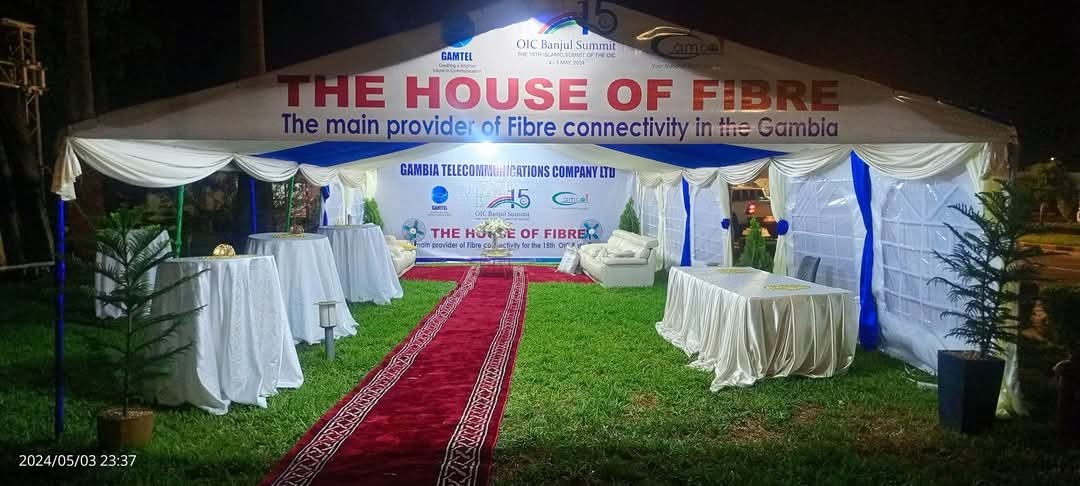Gamtel/Gamcel Restructure Sparks Unease Among Staff
Gamtel at the OIC
By Edward Francis Dalliah
As Gamtel and its mobile arm Gamcel press forward with a multi-phase restructuring initiative aimed at transforming the state-owned telecom giants, contract staff are sounding the alarm over potential exclusion from the plan’s benefits. Despite years of continuous service under annually renewed agreements, many fear they may be left behind in a process that promises financial support and professional transition only to permanent employees.
The plan, designed to support employees through a phased exit program based on age and years of service, is a key part of the ongoing transformation of the two state-owned telecommunications companies. However, some Gamcel staff on yearly-renewed contracts say they fear being sidelined.
According to concerned staff members, Gamcel currently employs two distinct categories of workers, permanent employees and those under the “Contract Casual Staff” designation. This group, they argue, has been serving the company for several years without being integrated into the permanent workforce, despite consistent contract renewals and incremental salary adjustments.
One contract agreement obtained by our medium reveals that a contractor was first employed in 2016 as a Customer Service Representative. The initial contract, set for one year, offered a total monthly salary of D3,000, which included a D1,000 transport allowance. Over the years, the contract was renewed annually, with eventual salary increases bringing the take-home pay to D4,950, including transport, extra duty, and residential allowances. Despite this extended service, the contractor was never made a permanent staff member.
A document signed by Gamtel’s Managing Director, Mr. Lamin A. Tunkara, dated 27th March 2025, confirms that the Government of The Gambia is undertaking broad reforms targeting state-owned enterprises, including Gamtel and Gamcel. These reforms, the document notes, “are geared towards ensuring that both Gamtel and Gamcel are repositioned and restructured in such a way that makes them viable and competitive.”
During a recent oral question-and-answer session in the National Assembly, the newly appointed Minister of Communications and Digital Economy, Hon. Lamin Jabbi, informed lawmakers that the social plan had been presented to and approved by the Cabinet as a strategic intervention to revitalise both telecom companies.
Based on documents reviewed by this medium, the social plan includes both voluntary and involuntary staff departures and is designed to ensure a financially and professionally secure transition. The plan is divided into four phases:
Phase 1: Voluntary Departure (Under 55 Years)
Employees under the age of 55 who voluntarily exit the company will receive six months’ net salary, plus two months’ gross salary for each completed year of service, covered at 17 years. They will also receive D10,000 for relocation, as well as access to business registration support, professional training, financial advisory services, and social security contributions (for those aged 45 and above). However, contract staff fear this phase may leave them out due to their non-permanent status and shorter service duration.
Phase 2: Voluntary Early Retirement (Ages 55–59)
This category offers eligible employees one year’s net salary, continued pension contributions until official retirement, and D10,000 for relocation.
Phase 3: Retirement by Redundancy (Ages 45–54)
Employees aged 45 to 54 who are retired as a result of declared redundancies will receive 12 months’ gross salary and a D10,000 relocation allowance.
Phase 4: Redundancy (Under 45 Years)
Employees under the age of 45 whose roles are rendered redundant will be granted six months’ net salary, two months’ gross salary per completed year of service (up to 17 years), and D10,000 in relocation support.
Currently, phase 1 has been launched with a “Voluntary Departure Application form” rollout for staff. However, while the plan may offer what many view as generous compensation and transition support for both telecom employees, it has stirred unease among contract workers. Many fear they may not qualify for the financial and social support outlined, despite years of continuous service.
As Gamtel and Gamcel move forward with the implementation of this ambitious reform plan, the spotlight is now on how the concerns of non-permanent staff will be addressed.
Askanwi has been following the issue surrounding Gamcel and Gamtel. Here is a list of related publications.
Finance Minister Confirms Government’s $10M Rescue for GAMCEL Salaries

